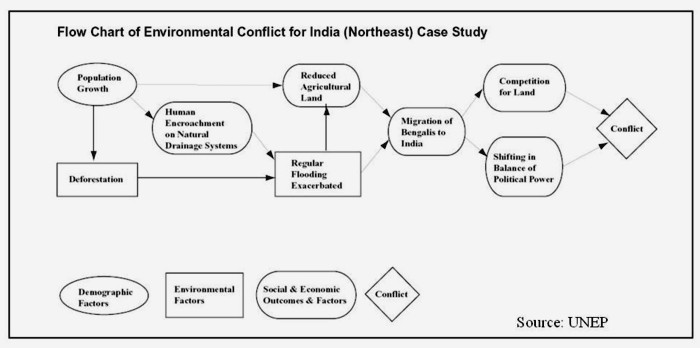A workshop on ‘Understanding and resolving water conflicts in the North East India', was organized by Forum for Policy Dialogue on Water Conflicts in India (Forum), in collaboration with Aaranyak (Guwahati), Centre for the Environment, IIT (Guwahati), Arghyam (Bangalore), SaciWATERs-CapNet Network (SCaN) and Cap-Net to discuss emerging issues related to water conflicts and their resolution in the region. This workshop was held in Guwahati on January 23-26, 2012. It aimed at presenting concepts and theory related water conflicts as well as issues especially relevant to the North East Region.

This page collates the various presentations made during the course of the workshop.
Overview of water and water conflicts in North-east India by Chandan Mahanta
This presentation presents the issues pertaining to water in the North-east region and explains how they may cause conflicts to arise. It focuses on groundwater quality issues and the inequities of hydro-power development. The presentation ends with suggestions to mitigate these conflicts.
Water resource conflict: A theoretical perspective by Rushabh Hemani
The nature of water conflicts, and the factors that contribute to them are described. This is followed by an explanation of the various means of mapping and analysing conflicts.
Methodologies for conflict resolution by KJ Joy
Conflicts exist when groups perceive that their interests are incompatible. This can spur dialogue and positive change. An overview of the various theories around conflict resolution is presented. These include:
- Theory of impossibility
- Game theory
- Theory of rationality and common property resources
The various methods for conflict resolution, whether judicial or dialogue-based, are explained. These include:
- Negotiation
- Mediation
- Arbitration
- Conciliation
- Collective bargaining
- Multi-stakeholder process
Multi-stakeholder dialogue as a possible way of conflict resolution by KJ Joy
Beginning with a definition of the term 'stakeholder', the presentation goes on to explain the concept, method, and advantages of stakeholder analysis as a means of understanding a situation and initiating dialogue. This process is illustrated considering existing conflicts in the Chennai peri-urban area and in Palar basin.
The normative concerns of development: Livelihoods, sustainability, equity and participation/democratisation by Suhas Paranjape
This presentation discusses the above four concerns of development, while stressing that these are not in sequential order, but an integrated set, where each is as important as the other.
Conflicts over water-induced hazards and their management: Perspectives from Assam by Partha Das
Assam is vulnerable to floods, flash floods, river bank erosion, land degradation due to sand casting, and dam induced flooding. Despite this, there is no policy dedicated to the management of water-induced hazards, which compounds damage and leads to conflicts over management approaches, siting of infrastructure, losses, compensation and ownership of assets. These conflicts are explained in detail in this presentation. The various policies and institutional structure in place as well as their shortcomings are also summarized.
Understanding water: The bio-physical and socio-cultural dimensions of water by KJ Joy
There are several perspectives in which to consider water - as an ecosystem component, as a common pool resource, a local as well as a non-local resource. In addition, human beings have several cultural ties with water which are recorded in mythology, rituals and recorded history. These dimensions and their implications are described in this presentation.
A report by Raju Mimi (a journalist with Arunachal Times), who participated in the workshop, is available here.
The presentations of this workshop are available with the individual authors / presenters and can be sourced by writing to them.
/articles/multi-stakeholder-dialogue-messy-necessary